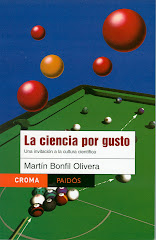Published on Milenio Diario, December 31, 2008
 It shouldn't come as a surprise. After all, it comes from the Pope that attacks gender ideology by stating that "it's opposed to human nature" and that it seeks to "emancipate man (sic) from creation and the creator" (in reality, it has been useful to defend women rights).
It shouldn't come as a surprise. After all, it comes from the Pope that attacks gender ideology by stating that "it's opposed to human nature" and that it seeks to "emancipate man (sic) from creation and the creator" (in reality, it has been useful to defend women rights).
He's the same pope that declares that "saving humanity from homosexual or transsexual behavior is as important as avoiding the destruction of jungles" and that to protect "human ecology" (ignoring the precise meaning of the term) compared such behaviors to a "destruction of god's work".
He is the Pope that defends "fundamental Christian values" but considers that they include a deep intolerance towards sexual diversity and women's and men's right to fully enjoy their own bodies and to take decisions over them.
Recently he rejected sex change surgeries because they "contradict God's decision".
These press statements serve to justify discrimination and unjust actions such as the State Family Council of Guadalajara (Consejo Estatal de la Familia de Guadalajara), which decided to separate the girl Rosa Isela from her adoptive mother, who raised her for eight years, only because the mother, Alondra, was born as a man named Alberto. The council has maintained Rosa Isela illegally kidnapped though a judge conceded Alondra the custody of the child.
Pope Ratzinger criticizes relativism: to think that things are not intrinsically good or bad; that this epends on the context. But now he is taking advantage of the 400 years celebration of the first telescopic observation by Galileo and of the celebration of the International Year of Astronomy to try to wash the image of the Catholic Church, an institution that traditionally has been an obstacle for science.
He is now proposing through the Pontifical Council for Culture that Galileo, convicted by heresy in 1633, "could be the ideal patron of the dialogue between science and faith".
If there is a distinction between science and religion is that science does not pretend to have absolute truths. Ratzinger, which says he "is convinced of the congruence between faith and reason, seeks to "give reason its deserved place in all the scheme of things". Taking into account Galileo's history, we can imagine what place that is.
It shouldn't come as a surprise, but still it makes one feel indignant.
Happy 2009!
(translated by Adrián Robles Benavides)
To receive Science for pleasure weekly
in your email, subscribe here!




No comments:
Post a Comment